A survey of attitudes toward housing released on Thursday by The Demand Institute indicates that the Baby Boom generation still has no intention of aging gracefully. In fact, when it comes to housing it appears few intend to yield at all to their advancing years.
The Institute, a nonprofit run by the Conference Board and the Nielson ratings people, surveyed 4,000 households last year in which residents qualified as members of that huge post-war generation born between 1944 and 1963 about their future housing plans.
The survey found that as a group Baby Boomers had a median net worth of $200,000 in 2007 and were on their way to accumulate nearly $370,000 by 2013. Instead the recession sent many off the rails and at the time of the survey that median net worth was down to a median of $143,000. Although many Boomers have delayed or modified their plans due to the recession they have, the Institute says, not abandoned them entirely. Over the next five years it is expected they will spend $1.9 trillion on new home purchases and $500 billion on rent.
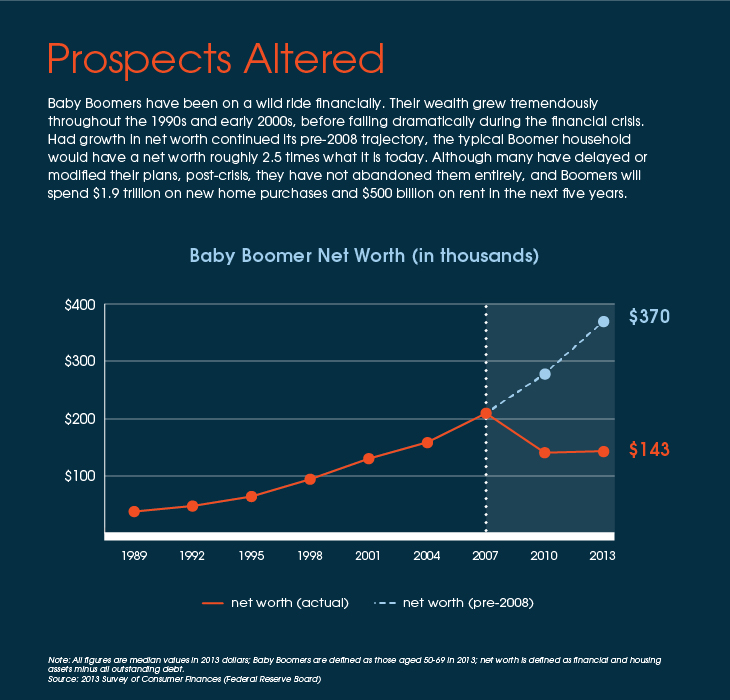
Whether for financial reasons or by choice the majority of the generation is still working but 58 percent plan to retire within five years. Among younger members, those 50 to 59 at the time of the survey, only 23 percent were retired while 34 percent planned to be within that time frame. Sixty-nine percent of the older group, those 60 to 69 years of age, were already retired and 80 percent had plans.
Whatever their working plans, the survey found that the generation has some counterintuitive plans for their housing. Thirty-seven percent said they plan on moving, but while the common wisdom has older folks downsizing as they age, 46 percent of those who plan to change locations are looking for nicer homes or more space. Nearly half plan to spend as much or more money on housing after they move.
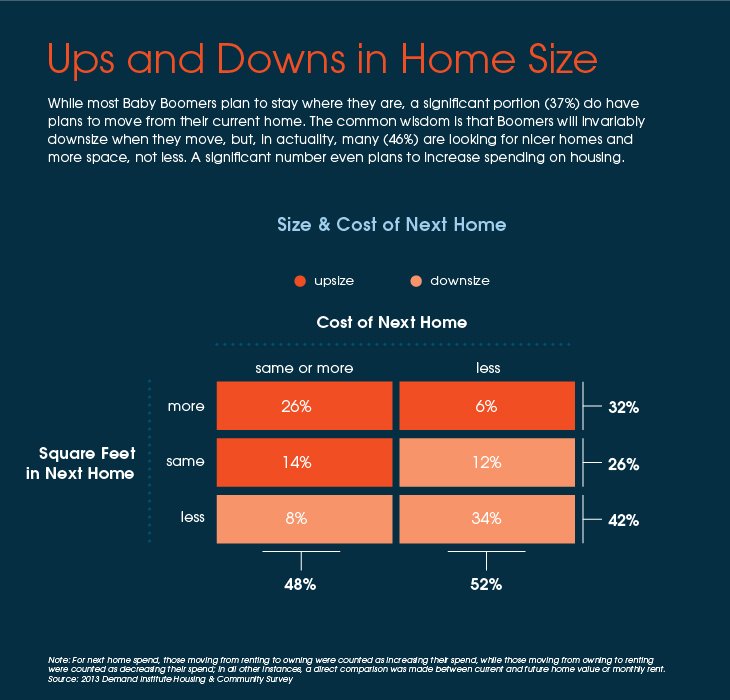
The Institute says the 46 percent of those respondents who are looking for a larger home or plan to spend as much or more as they currently do are less affluent than the respondents overall and many delayed their housing plans because of the recession and its impact on their finances. They have median net worth of $40,000 and currently live in a home with a median of 1,200 square feet. "Downsizers" on the other hand live in a median 2,000 square foot home (compared to 1,600 for all respondents) and have median net worth of $322,000.
"Upsizers are finally looking to purchase their dream home," the report says. "Many in this group will move from renting to owning, but they are not necessarily looking to spend lavishly - the median price of their next home will be $180,000, less than the $200,000 of the more affluent "Downsizers."
The "Downsizers" are either looking for a smaller home or to spend less for a home similar in size as they own or currently occupy. "Many are currently living in larger, more expensive homes that will be difficult to maintain as they age. But just because they are looking for smaller homes, it doesn't mean they are necessarily looking to settle. Many will seek homes with high-end finishes and nearby services and amenities."
Those who plan to move won't go far. Sixty-seven percent say they will stay in the same state and a quarter plan to stay within 10 miles of their current homes. The remaining third are motivated as much by wanting to live closer to family as they are by a change of scenery or climate. Maintaining connections to friends and community is an important consideration and only about 20 percent of those who will move are interested in residing in a senior community or retirement setting.
Whether downsizing or not, most Baby Boomers who plan to move will continue to live in single family homes and most intend to buy. While slightly less than half currently live in one-level homes one is an overwhelming choice for the next home. Despite the maintenance, most still want a house with a garden or yard.
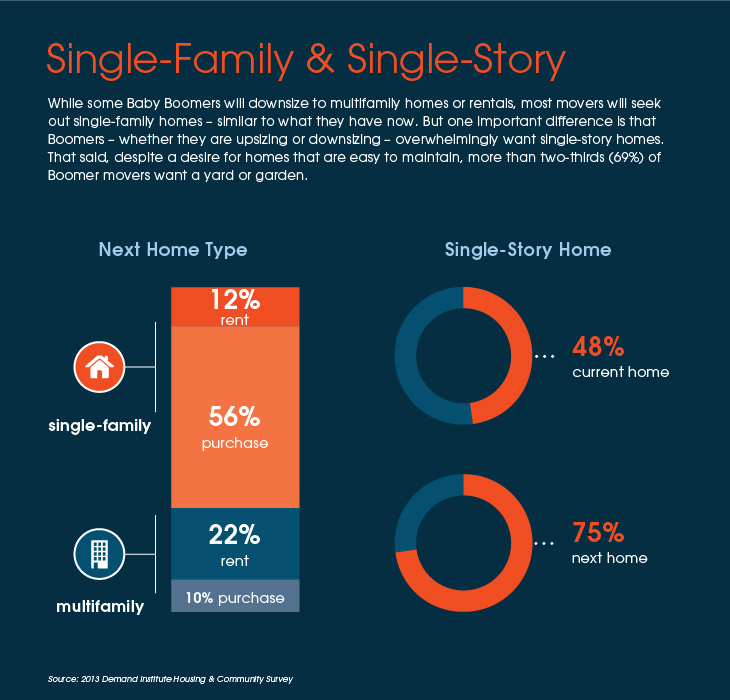
The postwar generation is carrying much more mortgage debt than did earlier generations at the same stage of life - a median of $118,000. This is an increase of 142 percent since 1992 when the median was $48,743. But this is a generation that has never shied away from debt and 56 percent of those who plan to purchase their next home said they will seek a mortgage to do so. Seventy-seven percent are confident they will qualify.
But back to those Baby Boomers who plan to stay put. The Institute says that not only do they prefer to age in place, they also feel their homes are set up to allow them to do so. This despite the fact that many lack "aging-friendly features." In addition, three quarters of those households surveyed have already had a major health incident or have a member with a chronic health condition. This, the report says, further calls into question just how suitable these homes will be in the coming years.
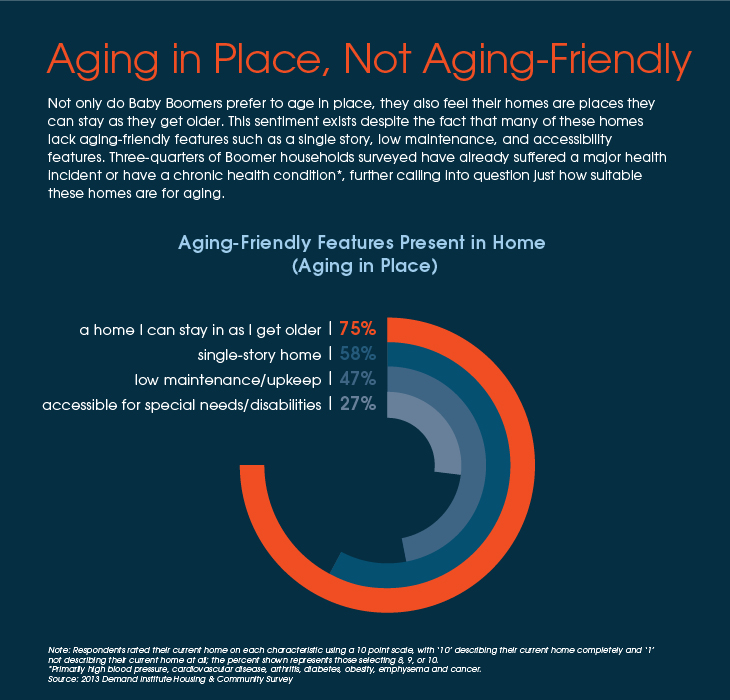
These agers-in-place also show little motivation to change the accommodative features of their homes. While 39 percent say they have plans to do a major home improvement in the next three years, making the home more aging friendly does not top their list of reasons for doing so.
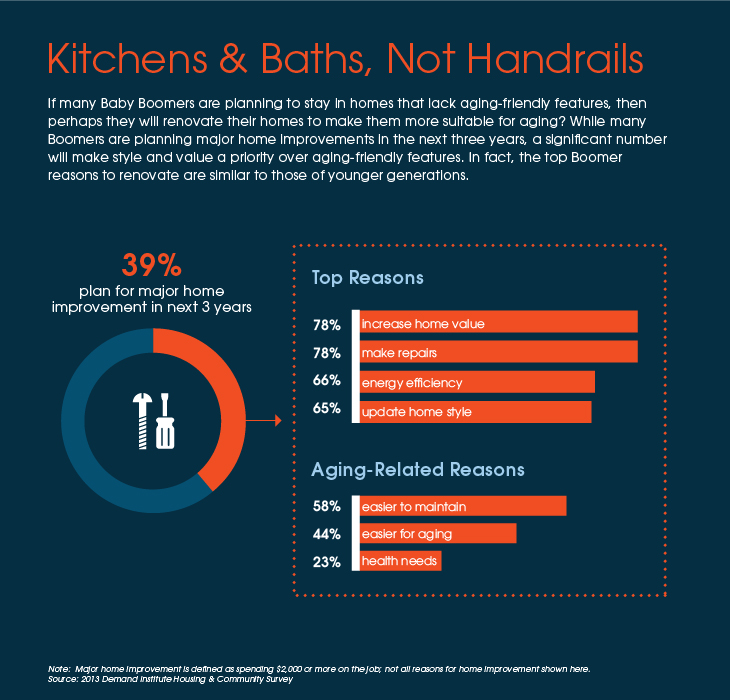
The Institute asks if all Boomers are making the most prudent housing decisions as they approach retirement. "Not necessarily," they say. "Regardless, their decisions will have important implications as this generation, once again, does it their way."







